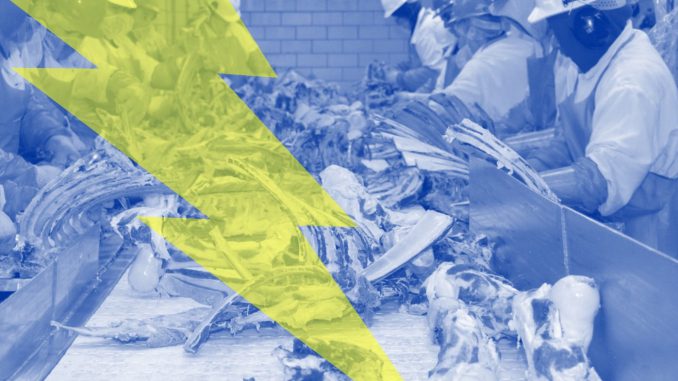
For Immediate Release: April 19, 2020
Contacts: Sen. Nate Boulton (515-669-4259); Sen. Bill Dotzler (319-240-5594): Sen. Kevin Kinney (319-631-4667)
As the COVID-19 public health emergency worsens, three Iowa State Senators are calling for immediate action in response to multiple outbreaks at meatpacking facilities across the state.
The Senators are calling for immediate action by state and local officials to:
- Protect the health and safety of Iowa’s essential workers when they are on the job.
- Stop the community transmission of COVID-19 among family members, neighbors and others who may be in contact with infected essential employees.
- Prevent long-term interruption of the nation’s food supply.
“These Iowans are showing up for work, being pressed into service for our economy and for the food security of our nation, but have little confidence that their state or their employer are concerned for their safety. These outbreaks are startling—and so is the lackadaisical attitude coming from the state on what needs to be done,” said Senator Nate Boulton of Des Moines.
“While the meatpacking plant outbreaks are drawing attention now, there are many other manufacturing facilities across the state that could face similar problems if protocols are not established and implemented now,” added Boulton, who grew up in Columbus Junction, where the COVID-19 outbreak is one of the worst in the nation.
“What we are seeing play out is borderline criminal,” added Senator Bill Dotzler of Waterloo. “I represent workers who are telling me that even the voluntary precautions being taken aren’t doing anything. They’re having temperatures taken and the results ignored. These workers then go to work in close proximity throughout their shifts, go out into the community and expose community members, then go back into the plant where it all starts over again. Action must be taken immediately to stop further spread of COVID-19 and protect not only the workers at these important facilities but our communities as a whole.”
“I see problems in two places: the livestock agriculture community and the meat processing workforce. I’m hearing from workers that they feel completely expendable right now, particularly immigrant workers who are trying to make a better life for themselves. They feel particularly at risk,” said Senator Kevin Kinney of rural Oxford, a grain and livestock farmer. “But outside those packing plants, farmers across the state are concerned that unaddressed problems in the packing plants will lead to widespread outbreaks in those facilities that could shut them down for long periods of time. If that continues, we are going to have a lot of farmers with no place to market hogs, chickens and cattle in this state.”
The Senators are calling for three immediate points of action to address this crisis:
- The State Labor Commissioner — with input from representatives of the major livestock processing companies, representatives of the major labor unions representing livestock processing workers, and the department of public health – must issue stricter requirements for worker safety operational standards and protocols that include consideration of systemic disinfecting, reorganizing, and reopening closed facilities after new safety measures are put in place.
- As part of the process of seeking input on safety protocols, Iowa’s Labor Commissioner and Iowa Department of Public Health must also develop new public health crisis emergency rules for limiting the spread of COVID-19 in manufacturing and livestock processing facilities.
- Iowa OSHA inspectors must immediately inspect each livestock processing facility to ensure current and any newly-enacted emergency rules and standards are being followed. According to the Labor Commissioner, not one meatpacking facility in Iowa has had an OSHA inspection since the public health emergency was declared.
“Protecting both Iowa workers and the nation’s food supply is just too important for us to wait and see what happens as individual meatpacking companies are left to lead on this. Hoping for the best is a high-stakes gamble that threatens the health and safety of thousands of Iowans,” Boulton said.
-end-
